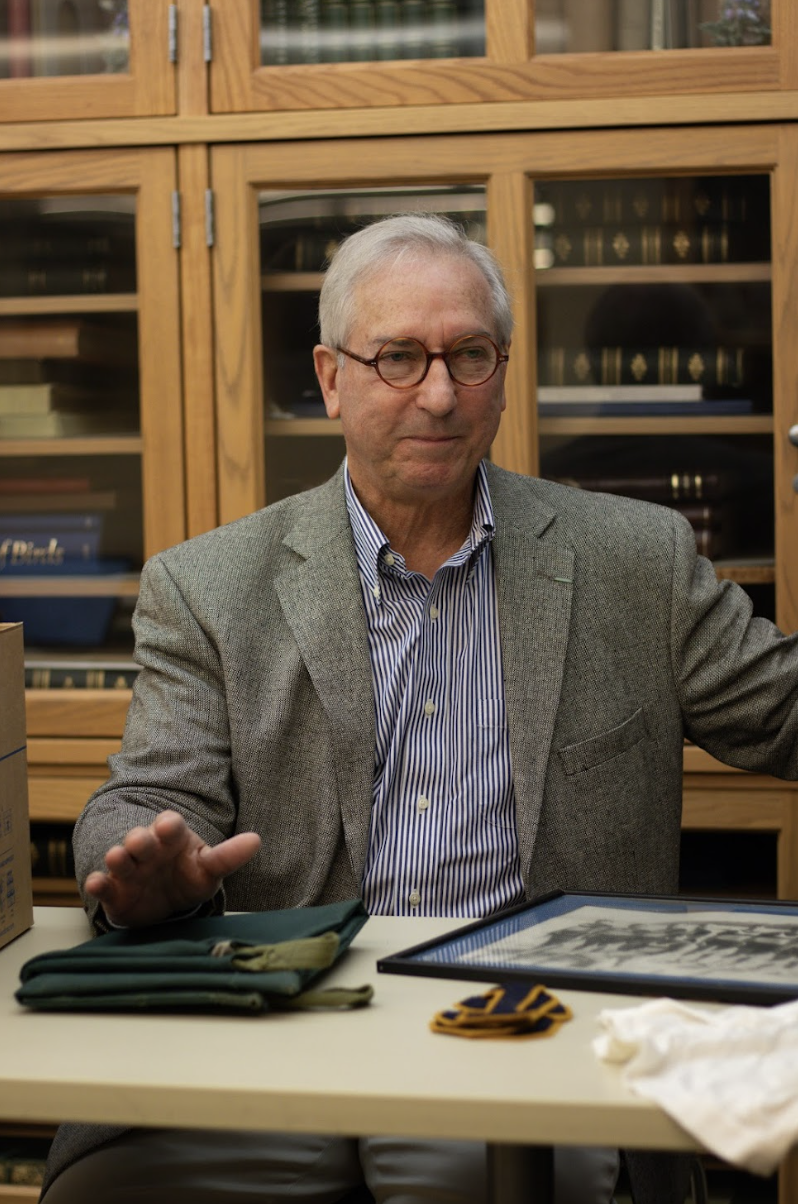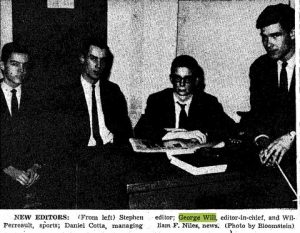Lily Mellitz ’26
Executive Features Editor
Alden Gordon, an esteemed Trinity College alumnus and accomplished Professor of Fine Arts, is preparing to retire after decades of service. His journey with Trinity is a rare one, as he first walked the campus as a student, then returned years later to teach. In a candid conversation with the Tripod, Gordon reflected on his time as a student, a member of the rowing team, and his experiences as editor of our very own Trinity Tripod.
Gordon originally hailed from Norfolk, Virginia, a community where residents often stayed close to home for their college education.
“It was […] very, very conservative,” Gordon recalled. “It’s the middle of the Vietnam War. The Ku Klux Klan is burning crosses out of the county.”
Eager for change, Gordon decided to head north to Trinity College, where he joined the crew team — a sport that “nobody […] south of Baltimore had even heard of” — and the student newspaper.
Gordon’s involvement with the Tripod began during a turbulent era — the late-1960s — when the Vietnam War loomed large, influencing both campus life and student activism. The paper was published twice a week, demanding late nights and hands-on work from the staff. Back then, the Tripod offices were in the basement of Mather Hall. Staff photographers worked out of a makeshift darkroom built into a janitor’s closet developing black-and-white film on-site after covering campus events and sports games. They would create contact sheets and carefully mark the best shots for print with grease pens, then head back into the darkroom to enlarge selected photos, using chemical solutions to bring each image to life.
Every Sunday and Wednesday night, they’d physically deliver the finished layout to Imprint, a printing press in West Hartford — a step that feels worlds away from today’s digital publishing. Gordon recounted those long nights with nostalgia:
“I remember being out there at that Imprint press until three, four in the morning,” he said. “If the story was too long, we didn’t have time to retype and reset it. We literally took razor blades [and] cut sentences out or cut paragraphs out and moved them around […] until we could make it physically fit the column.”
Gordon’s leadership of the Tripod came at a crucial time for both the college and the nation. Trinity, like many campuses across the country, was a hotbed of political activism. Gordon was deeply involved, but he maintained journalistic neutrality, covering the events of the era with an objective lens, something he takes pride in to this day. This was no easy task, as students regularly organized protests, some even locking Trustees in a building to demand more scholarship money for local Black students.
“We stayed neutral,” Gordon said. “I mean, we covered the story, [but] we did not participate. We covered both sides, you know, and we would never, ever publish anything anonymously.”
In addition to his editorial work, Gordon had an impressive academic career at Trinity, majoring in both English and art history. His passion for art eventually guided him toward his future profession, but his decision to go into academia was not straightforward. Initially, Gordon had plans to attend law school and even toyed with the idea of entering the diplomatic corps. However, the political climate at the time made him reconsider this path.
“I couldn’t go into the diplomatic service with Nixon as president,” Gordon admitted. “He was untrustworthy, and for some reason I was too dumb […] or too naive to realize he wouldn’t be president forever.”
After graduating from Trinity in 1969, Gordon embarked on a global journey, studying in Germany to improve his language skills and working at prestigious institutions like the Tate Gallery in London. Gordon’s love for travel and languages eventually led him to art history, where he found a career that allowed him to indulge these passions while contributing to the academic world. These experiences eventually brought him back to the U.S., where he pursued graduate studies at Harvard and completed dissertation research in Paris.
Gordon’s return to Trinity in 1978 was a fortunate twist of fate. He and his wife, Jean Cadogan, current Professor of Fine Arts at Trinity, both secured jobs in Hartford — he at the college, and she at the Wadsworth Atheneum. This marked the beginning of a long career at Trinity, where he not only taught but also served as a mentor to countless students.
Over the years, Gordon witnessed significant changes at the college. He recalled his own student days when Trinity was still an all-male institution, with socializing often involving road trips to nearby women’s colleges or “inviting women to perform in shows from other colleges around.” The introduction of coeducation in the late 1960s dramatically changed campus life, and Gordon was there to see it unfold.
As Gordon prepares to retire, he reflects on his nearly five-decade-long career with pride. His association with Trinity, which began in 1965, will leave a lasting impact, both in the archives of the Tripod and in the memories of the many students he mentored. His story is one of transformation, not only for himself but for the college as well. From a young man eager to escape the conservative South to a professor at a liberal arts college in New England, Gordon’s journey has been one of growth, exploration and deep connection to the institution that shaped his life.
In his final reflections, Gordon emphasizes the enduring value of Trinity College, from both the perspectives of a formal student and an educator.
“The small liberal arts college model is a kind of American specialty,” Gordon stated. “It’s a very fine form of education, and I understand it’s a very expensive form of education, but [it] gives students an opportunity to work one-on-one with professors. You form lifelong friendships this way [and] it’s a kind of lifelong service, you know? I still have students get in touch with me whenever they’re going to be in town.”As he steps away from the classroom and his role as Paul E. Raether Distinguished Professor, Gordon leaves behind a legacy that will inspire future generations of students and faculty alike. His commitment to education, his love for the Tripod and his dedication to Trinity College have shaped not only his own life but also the lives of those who were fortunate enough to learn from him.





Congratulations to Alden! It’s hard to believe that some 57 years have passed since I first met A. Rand in the office of the Tripod in the basement of Mather Hall. He was soon to become editor, and in that post he did a terrific job — an always thoughtful and calming influence able to manage a rather rambunctious and highly opinionated staff. I respected Alden not only for his work as a journalist, but also for his deep commitment to raising the artistic awareness and cultural level of the campus. All the best to you in the years ahead.